Cottagecore
Or How SIR JOHN GIELGUD Went to the Gents’ and Almost Lost It All
Looking up at the stars, I know quite well
That, for all they care, I can go to hell,
But on earth indifference is the least
We have to dread from man or beast.How should we like it were stars to burn
With a passion for us we could not return?
If equal affection cannot be,
Let the more loving one be me.— W.H. Auden, “The More Loving One” from Homage to Clio (1960)
A lady, let’s face it, gets an itch every now and then.
Not me. I’m asexual.
Blrrrp!
Oh, ignore that. It’s my phone. As I was sayin–
Blrrrp!
Apologies. I’ll mute those not-Grindr alerts for something more mellifluous. A string section of the world’s tiniest violins.
I’m [redacted] years old and I’ve never been in a relationship.
There’s no one to hold Mark’s hand. Never has been! Or embrace him in a moment of doubt. I’ve seldom danced with anybody. (Sorry, Whitney.) My nightclub days, when Rihanna’s “We Found Love” reigned, boil down to one memory. Clutching my friends’ coats. I’ve yet to experience spooning, sipping Bovril, and enjoying a Cadbury’s Creme Egg with another person. Just the two of us, cosily romantic – with Howards End on in the background – while falling asleep in our hammock. I’ve never had, nor been, a plus-one. Alone life’s travails are borne! No partner to split shaving cream, deodorant and beard oil. The window on shampoo, I fear, is rapidly closing.
True, I’ve had dalliances. Grim humiliations that left me wondering if I’d ever ride a bicycle again. Someday my prince will come. Prince “Godot”!
Is there a more worrying harbinger of glenntrification than the mens’ toilets in the local shopping centre becoming a cruising spot? Allegedly. I’ve heard this from several people. The most recent being “Al” from Vanessa’s Varicose Veins. I warned everyone that the neighbourhood was heading that way when they started selling two types of hummus. But would you listen?
Cottaging wouldn’t suit me. An epithet which derives from the restrooms erected on the 1848 Public Health Act’s recommendation. Built to improve hygiene in the growing cities, these “cottages” had a secondary function. A discreet location for Other Bus-ers to have sexual encounters. Victorian linguistic politeness was at play here. It wouldn’t do to call them “toilets” or “lavatories”. “Public conveniences”, maybe, or “water closets”: a formality that extended well into our time. Cast your minds back. From my glenntrified supermarket’s WC – I have a friend called “William Casey” and, as bad as my name is, “Mark O’Done-a-man”, they called me in the borstals; at least I wasn’t christened after a commode! – to the seedy underbelly of 1950s London…
Across the West End, a clandestine cluster of cruising cottages crept. In Leicester Square, in Charing Cross, in Victoria. The trail snaked from South Kensington along the Fulham Road to Dudmaston Mews where, on 20 October 1953, a great actor unknowingly stumbled into infamy.
Sir John Gielgud was a lady with an itch. Fortified by Dutch courage, it needed scratching. Sadly, the dreamboat he gave the glad-eye to was an undercover bobby. The Old Bill had dedicated “pretty police” who patrolled public lavatories as part of their beat. (“The police,” wrote Quentin Crisp “thought of homosexuals as North American Indians thought of bison. Exterminating them in herds.”) Caught in flagrante delicto, Sir John was hauled before Chelsea Magistrates’ Court, the next day. Utilising a bit of skulduggery, he passed himself off as Arthur Gielgud, a clerk. The beak slapped “Arthur” with a £10 fine, one percent of this lowly pen-pusher’s invented wage of £1000 per annum. A slap on the wrist, it came with the judge’s admonition to “See your doctor the moment you leave this court”. “Arthur”, it seemed, was home and dry.
The Grub Street hacks in the gallery thought otherwise.
Much like Tupperware parties, we forget what a powerful cultural force those sexually confused British theatrical knights were. Of course, they had antecedents: like Sir Gerald du Maurier and Sir Henry Irving. Dames, too: Sybil Thorndike or Gielgud’s grandaunt, Dame Ellen Terry. But in the postwar period, the profession’s panjandrums prostrated before the sovereign over a dozen years. Ralph Richardson led the charge. Sir Ralph’s inclusion in 1947’s New Year’s accolades chagrined Larry Olivier until Sir Laurence, too, was dubbed by His Majesty’s sword in the summer. The pattern repeated itself in 1959. Sir Alec Guinness and Sir Michael Redgrave schlepped to Buckingham Palace at six-month intervals. Bracketing these titans was Gielgud. Whose insignia in June 1953 carried a double distinction – as one of the Coronation Honours for the new Queen Elizabeth.
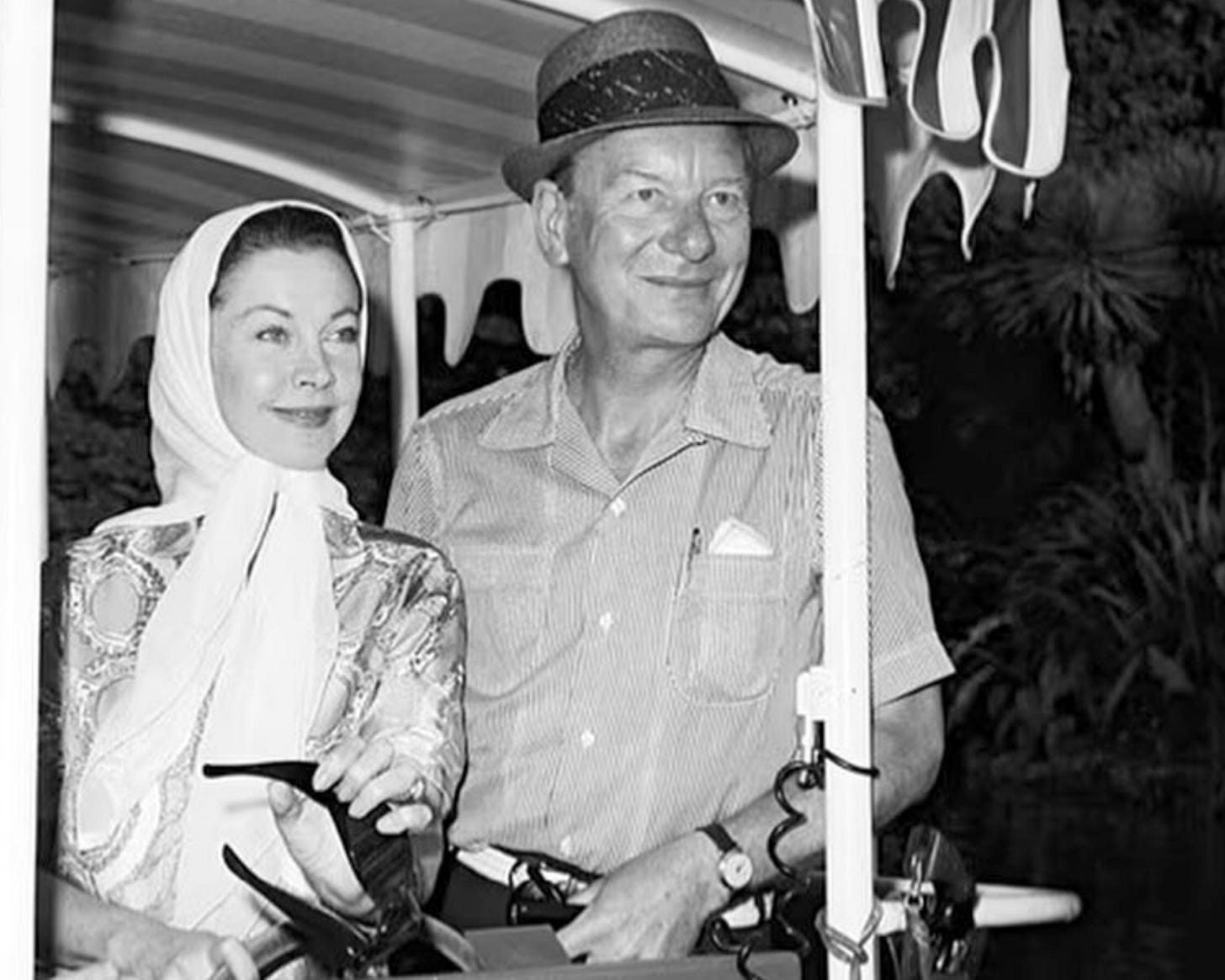
If you recall, Michael Redgrave described his hookups as “necessary degradations”. There’s something in that, isn’t there? Even now. Fifty-eight years after decriminalisation of homosexuality in the UK, and thirty-two in Ireland. (According to less scholarly biographies, Redgrave’s tastes were for sadomasochism; prompting Gielgud to deadpan “Ah, Sir Michael, I’ll be bound!”.) And far from being a hipster pastime like sourdough, perhaps necessary degradations are society’s last leveller.
“I’m not sure,” I said to my friend Al over coffee “I personally feel, you know, too good to go with low-rent gays. But not fit to wipe the elites’ boots.”
A vein in Al’s expansive forehead throbbed.
“It’s called the one-up-one-down theory of shame,” the glenntrifier proselytized.
“And me from a two-up-two-down!” I joked, trying to be funny. Secretly, I thought: here we go. Another dope who takes The Velvet Rage as revelation only to the New Testament.
“Are you on PrEP?” he asked.
“Oh, no,” I responded, my jowls turning scarlet. “My doctor won’t even prescribe Glennaster– Finasteride. I suppose she’d have to, though, if I asked for Pr– for that.”
I giggled nervously. Wanting to change the subject (and fast), I added:
“And she accuses me of “trendiness” with the autism and ADHD.”
“I find,” Al reasoned in the pseudo-American accent native to his race “the most chill people aren’t entirely neurotypical.”
Needless to say, I left before the urge to slit my wrists with a spoon grew too strong.
As I washed my paws in the lavatory where this cottaging supposedly takes place – the disabled one, which is a bit nicer – I weighed up the appeal of doing the “Bad Thing” there. Imagine that’s what I call sex!
The Mother must’ve watched Andrew Haigh’s All of Us Strangers with Miss Scott and Master Mescal over the Bank Holiday. Somebody did – according to activity on our shared Disney Plus account. (“Typical,” I thought “can’t stand her own one, but will watch that pair do the Bad Thing.”) When Gielgud fell foul of the pretty police in Dudmaston Mews, he was 49. The same age Andrew Scott is now. Sir John couldn’t fill a sweater like Andy, though. Who can? There’s no greater hunk than Tom of Churchtown! Yes, I’ve taken down all my posters of Wallace Shawn and Bruce Vilanch and replaced them with Andrew Scott ones. A tall drink of Metamucil.
By 1953, Sir John had given up the hair as a bad job. When he arrived at a dress rehearsal in 1950, sporting a ridiculous cherub wig, the company erupted in such hearty laughter that he debuted his handsome shiny dome, the next day. “Farewell, my youth!” Gielgud cried. Privately, he grumbled about “those strands draped over the bald patch”, a depressing ‘do which his mate Nellie – Noël Coward to you and I – shared. An effete luvvie answer to “Just shave it, bro”; Gielgud opted to “go the whole hog and sacrifice the sides as well”. But disguised his pate in public. A beret, if you please, not our baseball caps. Hatfishing! Gielgud’s correspondence records the faint hope that it “will grow a bit stronger after the sun has shone on it for a couple of weeks”. My regimen of rosemary oil and Biotin is less futile.
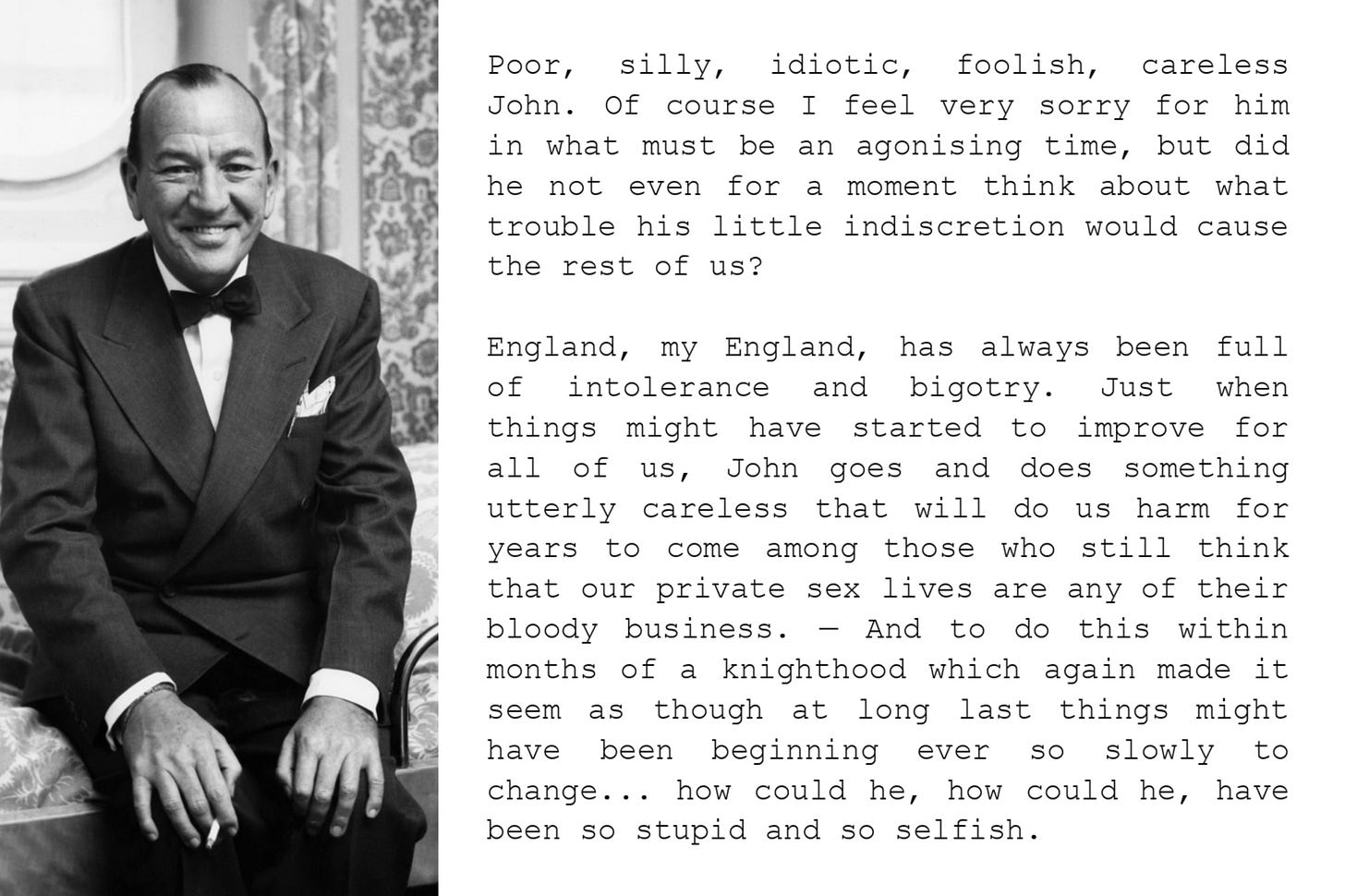
Despite a deep revulsion for my own body, the men I pine for are my mirror image. Heavens, even Streisand hasn’t such an EGO! (Honorary Tonys don’t count.) Sir John, his flings with younger men notwithstanding, managed a few long-term partners. John Perry, the Irish actor, was one; an interior designer named Paul Antsee, another. Wags speculated that Binkie Beaumont, the Cameron Mackintosh of his day, kept Gielgud on a tight monetary leash because of his romance with Perry, Beaumont’s own flame. “Fin dom”, I believe it’s called. Consequently, Gielgud only enjoyed the salaries of Richardson, Olivier, Guinness and Redgrave once Hollywood beckoned.
Two weeks after his cottaging caper, his first American picture opened in London. MGM’s Julius Caesar with Marlon Brando. Mumbles banked $40,000 as the Roman, much less than his usual fee, for this black-and-white quickie shot on recycled Quo Vadis sets. For Gielgud, who earned half, it was a windfall. A veritable fortune compared to the £50 a week he’d made when playing the role in Stratford, two years prior. Like his knighthood, Gielgud’s burgeoning movie career in middle-age, in addition to a significant improvement in his finances, was jeopardised by scandal. Weep for the men who lacked the wealth or connections to cushion their fall – whose circumstances, even if Gielgud found his own temporarily endangered, were less forgiving.
There was one more chap in his life. A Mitteleuropean named Martin Hensler, whom Gielgud met as a teenage vagabond in 1963. He picked him up in the Tate, mind, not a loo. Displaced by 1956, the Hungarian emigré served as Gielgud’s Man Friday for three decades until predeceasing him in 1998. Sir John braved the next two years and first five months of the new millennium alone.

The common thread in his liaisons is the conflict between personal happiness and societal expectations.
Not that I’d know. I behave in ways that intentionally dissuade potential beaux. When a man takes an interest in me, I clock that he’s flirting within six-to-eight business days. And the second it dawns, I start eating. Until my taut belly presses down on “Little Mark” like a furry chastity device. Forgive me for being so crude. No more than the mournful violins that opened this tale, I’m not fishing for sympathy. Merely to inform you that in Sir John’s time, there were more conspicuous marks of Cain than a dad bod or receding hairline.
Alan Turing, condemned in January 1952 for “gross indecency” – the same statute that sent Oscar Wilde to Reading Gaol, fifty-seven prior – was a mutilated man. Gynecomastia, alongside uneven weight distribution, developed due to injections of female hormones. A barbaric “treatment” which left him impotent and branded with breasts. For reporting a robbery in his own home. Whereupon the cops uncovered his tryst with a young crony of the burglar’s. Alan Turing – the Enigma mastermind who shortened the war by two years! Not, I concede, that its severity would be commuted if the regime mandated it upon a dustman or, like Gielgud’s alter ego in the dock, a clerk. Thousands were arrested every year. Gay men and motorists were the largest class of lawbreakers in the land. Their crime was their essential nature. And the punishment? Public pillory and institutional humiliation. Turing faced Hobson’s choice. Prison or stigmatised surveillance. He selected the evil of two lessers. “Chemical castration.” A year’s compliance to the invasive brutality of authorities and medics. It was the beginning of the end of a life of brilliance.
Paralysed by fear and shame, Sir John Gielgud contemplated taking Turing’s tragic final step. He found himself in Liverpool during the eye of the storm. A pre-London try-out of a new play with Sir Ralph and Dame Sybil. Arriving at the theatre, he was confronted by homophobic graffiti and dire warnings that his Hollywood opportunities were dead. The company watched this broken man enter rehearsals – beret in hand, one assumes – via the auditorium. Press vultures hovered around the stage door. To break the ice, Dame Sybil teased: “Who’s been a naughty boy, then?”. (Racier sources claim she said “naughty bugger” – one hopes it’s true.) Moreover, Thorndike instructed the Royal Court’s staff to reroute hate mail to her. She promised to reply to each letter with advice to “extend Christian charity to somebody who was different”. Splendid woman! That night, she prodded Gielgud onstage with “Come on, John darling, they won’t boo me.” He earned an effusive ovation.
Perhaps, it was a liberal audience. But the public’s open-mindedness outpaced the government’s. Gielgud and other high-profile cases exposed hysteria surrounding a victimless offense. Scapegoats all, their notoriety garnered mainstream attention. Conversely, the idiocy of the legislation prompted a committee of MPs, led by Sir John Wolfenden, to push for homosexual law reform. Gielgud’s arrest influenced both the Wolfenden report of 1957 and the Sexual Offences Act, a decade later, which decriminalised homosexuality. And his career flourished! Culminating in an Oscar in 1982 and an Emmy in 1991. Unlike Barbra, Sir John completed the storied EGOT.
He never mentioned October 1953 again.
Letting one’s carnal needs go unfulfilled is a terrible thing. Gielgud scratched his itch and survived; Alan Turing didn’t. I’m still waiting for Godot.
True, I won’t be plying my trade at the WC any time soon, but I can see the appeal. Does it feel redemptive? A snatched connection in a world that hates you? It’s always hated me. While you’re tuning those violins, remember my rejection is most keenly felt from other gay men. I’ll never turn to the dark side, though. Becoming one of those PrEP-shamers or spineless “LGB without the T” quislings.
Pearl-clutching bootlickers who’d sneer at cottaging while undoubtedly in on the act themselves! Employing choicer insults, I’m sure, than “gross indecency” for deviants getting their kicks. Wringing hands over children who might stumble upon the cruisers mid-thrust. Or pointing grubby fingers at the poor unfortunate whose hookup turns out to be a queerbasher’s ruse. Always a consideration – I’m not here to downplay the security risks or victim-blame. But every day, the flames of “you’re asking for it” are stoked. Let’s spare a thought for the real people caught in the crosshairs of online vigilantism, a moral panic akin to the Lavender Scare of the 1950s. Construction workers, doctors, retail assistants, delivery drivers, teachers. Husbands, fathers, friends. Reduced to objects of our contempt.
We’re in a famine of empathy. Tearing each other apart with such beastly cruelty. Oh, society missed a trick when it rebranded loneliness as “solitude”. Mine feels so pronounced lately. For the crime of ageing, I suppose. Crushed by expectations and scant opportunities for real relationships. As Alanis Morissette once sang: “Isn’t it ironic?”. Thanks to technology, we’re more connected than ever! Yet we’ve never been so isolated. And that’s compounded by guilt in not letting lovers come our way because we feel unworthy of them. No wonder doing the Bad Thing in a bathroom stall sounds like a fleeting moment of salvation! For many, it’s the only lifeline they have. But we’d rather ruminate on horrors.
Four years ago, there was a sting in Dirty Dublin. When five cruisers were entrapped in a Marks & Spencer’s lavatory. I only learned about it yesterday when I mentioned the subject of this article to a pal. The story escaped me in 2021. Then again, maybe it didn’t. I just looked the other way. It’s how the bastards win: drowning us in relentlessly triggering news until we’re too numb to care. And if we do engage, it’s with whataboutism and logical fallacies. Many Other Bus-ers simply withdraw. Because they live with their parents. Because they have housemates who aren’t comfortable with them bringing a guy home. Because they can’t afford a hotel room or don’t drive; thus foiling a good rogering up the mountains.
Bigotry tainted this affair: a married Irish father stayed incognito, while the Brazilians involved were named, shamed and doxxed. Young men like us in that liminal late twenties-early thirties space. (And I intend to stay there as long as Andrew Scott did!) Simultaneously, a 29-year old Irish woman facing a bestiality case in Dublin’s district court was granted full anonymity. Screwing a Rottweiler is less offensive to polite ears than a “danger wank”.
My pal saw a silver lining. Still in the throes of lockdown, it was unlikely minors were around. In any case, that toilet, my old Trinity crying spot, is tucked away behind endless flights of stairs. Similarly, the mask mandate allowed those men to shield some of their dignity from rabid reporters and photographers at their hearing. “Pervert avoids jail after performing sex act in Marks & Spencer toilet!” heralded a red-top tabloid. Lifelong shame, torment and criminal records were meted out, instead. With fines. Additionally, a lawyer’s reckless relief that the incident didn’t happen near a school proved a baseless gaffe. One step forward, two steps back.
Sir John Gielgud bent but didn’t break. He never fully embraced his sexuality or took pride in his part in advancing liberalisation. “I do admire people like you and Ian McKellen for coming out,” he confessed to Simon Callow, his voice betraying a man who privately donated to gay causes, “but I can’t be doing with that myself.” Think about Alan Turing’s possibilities if he had lived beyond 41. His unmade contributions to computer science and artificial intelligence. They might well have shaped the screen on which you’re reading this!
Alas, history isn’t only about kings – or queens – but the everyday people who shape it. I’d like to dedicate this essay to the countless talents expunged from the record. Men and women who never had the chance to fully realise their potential or contribute their gifts to the world. And I dedicate it to those who feel trapped in prisons of their own mind or making. Castrating ourselves on internalised homophobia, our cage is just as insidious.
Don’t let your life be ruined because of who you love.
Blrrrp!
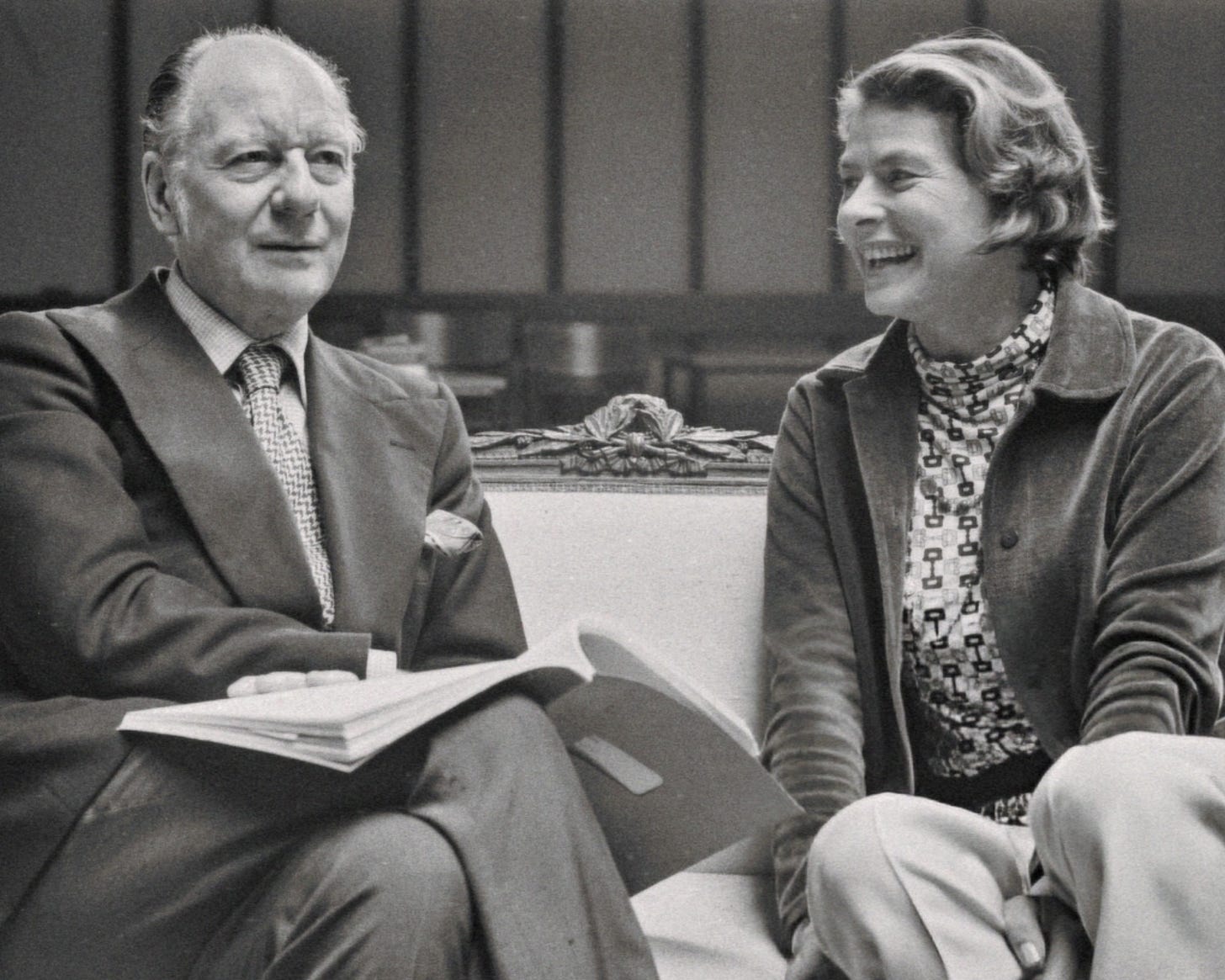
Read Next:
My Supporting Actress Series:
Vanessa’s Varicose Veins (1977)
Hattie McDaniel’s Legacy (1939)
See Also:


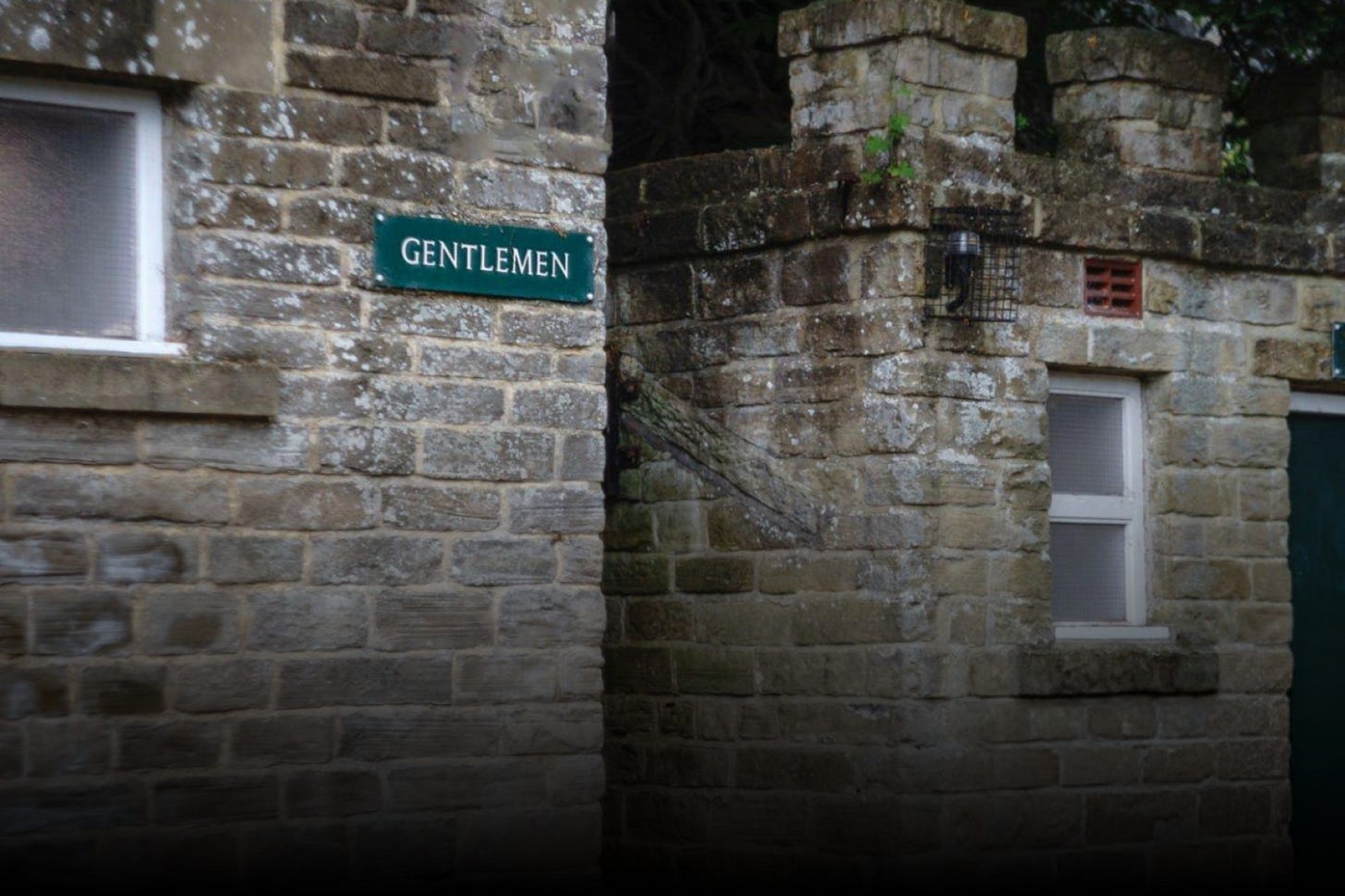
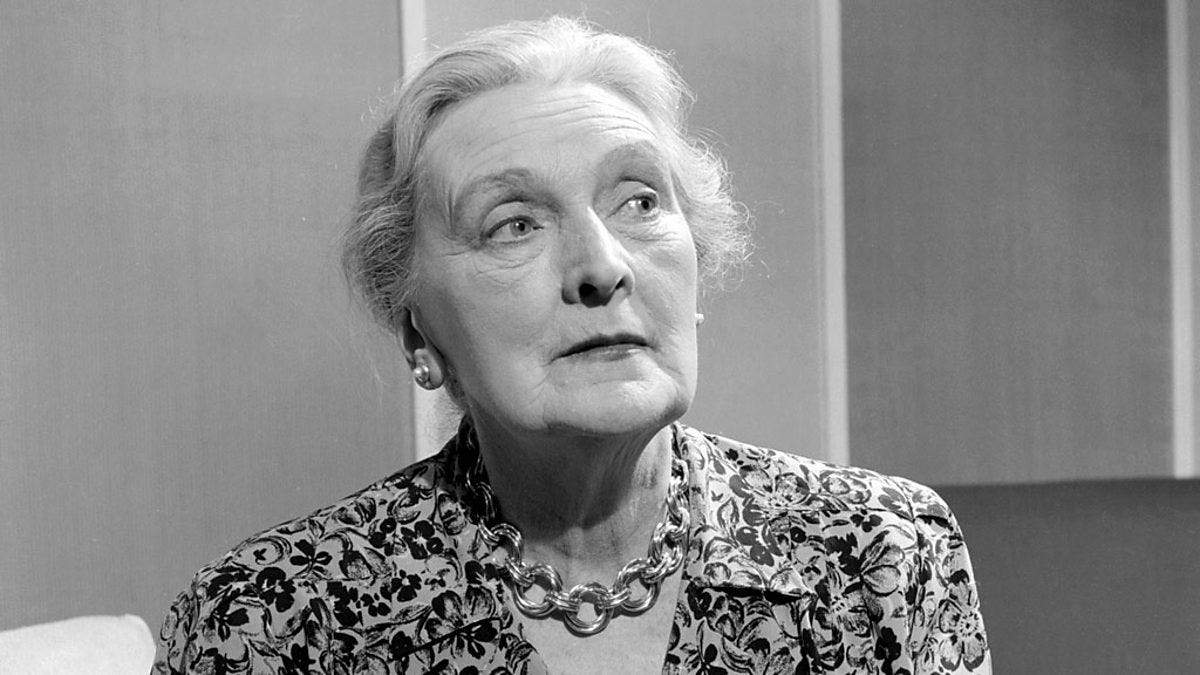
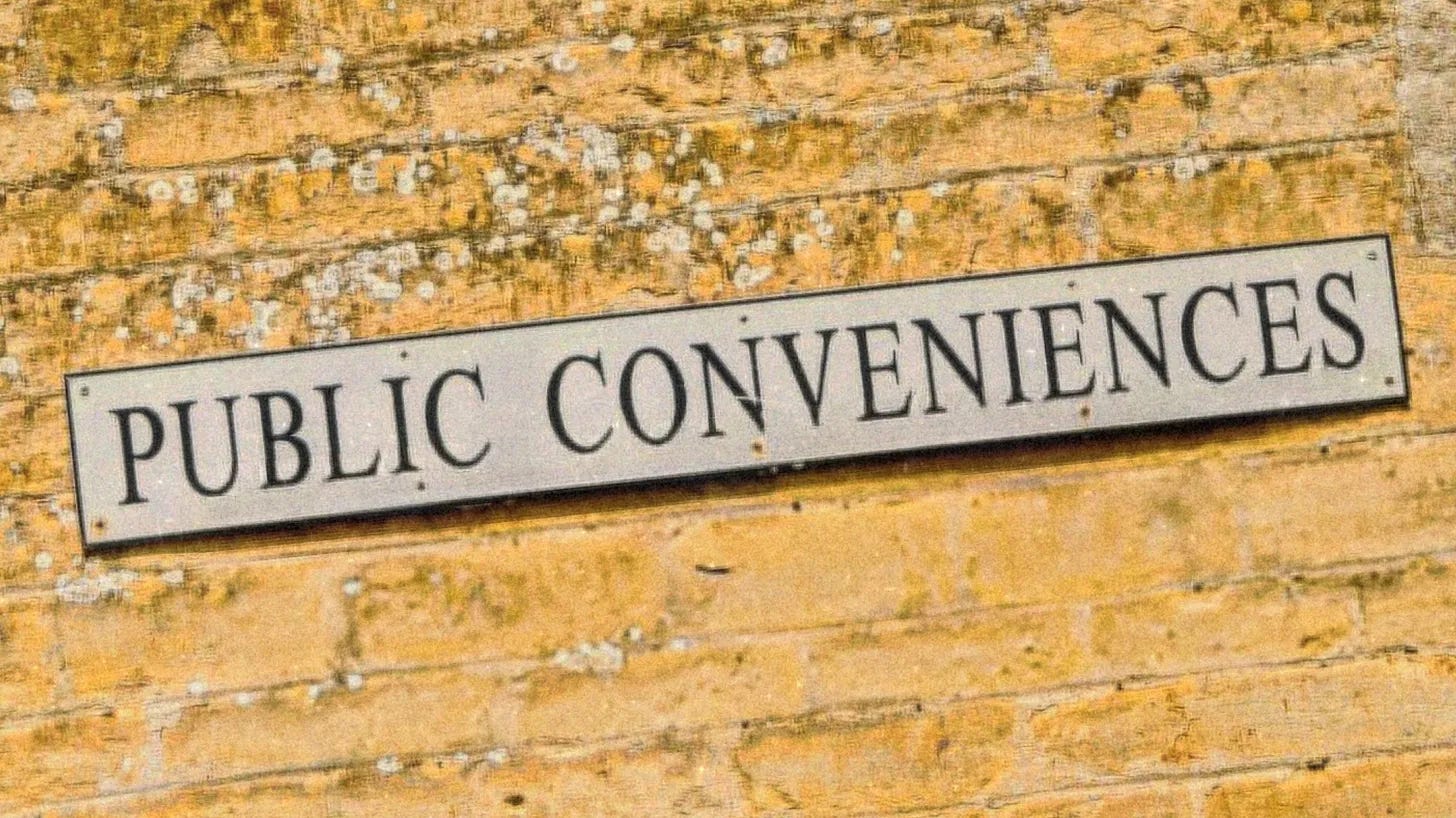

I loved this. You are so witty. I was by turns laughing, intrigued, and moved. This world IS lacking in empathy. I appreciate your voice.
Dearest Mark,
I'm not sure if you remember me, but reading this made me both ache for you and understand your feelings regarding modern culture. There's nothing wrong in getting the satisfaction you want through self pleasure and enjoying being single. Hookups aren't for everyone and your wit definitely brings the message home in a hilarious, almost satirical, way.
You're one of the most emphatic and brightest people I know. If you're never snatched up, it's the world's lost because you'd make any guy enjoy your company. Continue to write and love yourself, and you'll thrive. Thinking of you,
- Joshua